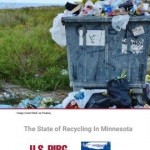The State of Recycling in Minnesota 2019
New study: Minnesota recycling programs experiencing mixed results
Minneapolis, MN — Minnesota is doing well in its recycling and composting efforts, but is struggling both to reduce overall waste and limit the burning of trash, according to a new study from Environment Minnesota Research & Policy Center. The State of Recycling in Minnesota highlights how structural challenges, the rise of plastic, the effects of failing to recycle, the impact of trash burning, and trends in the state’s recycling data.
New study: Minnesota recycling programs experiencing mixed results
Environment Minnesota Research and Policy Center

Minneapolis, MN — Minnesota is doing well in its recycling and composting efforts, but is struggling both to reduce overall waste and limit the burning of trash, according to a new study from Environment Minnesota Research & Policy Center. The State of Recycling in Minnesota highlights how structural challenges, the rise of plastic, the effects of failing to recycle, the impact of trash burning, and trends in the state’s recycling data.
The report reflects on how reliance on East Asian export markets, which are no longer reliably taking American waste, have impacted the state. It also shows that this is only part of the problem.
“The reality is plastic is so hard to recycle and so low value that we could only consistently afford to collect and recycle it when China was willing to buy it.” said Environment Minnesota Research & Policy Center’s State Director Tim Schaefer. “Now that we are left to deal with it ourselves, plastic is choking our recycling system as effectively as it chokes ocean life.”
The report outlines how Minnesota has increasingly improved the percentage of waste it’s composting and recycling.But, at the same time, the state has failed to decrease its total amount of waste. The report also looks at why the state burns a disproportionate amount of trash and explains why this isn’t economical, environmentally sound or good for public health.
Along with assessing state data, the report presents wide-ranging reforms necessary to reduce the amount of waste that ends up in landfills or is burned every year. Policies include cutting back on the amount of unnecessary plastic waste being created, encouraging the reuse of already existing objects, and making sure that products are recycled at the end of their working life.
“It’s entirely within our power to fix the system, but what is missing is the necessary sense of urgency,” said U.S. PIRG Education Fund Zero Waste Director Alex Truelove, who co-authored the report. “Recycling, composting and waste reduction efforts will need to play an important role in the fight against microplastic pollution, climate change and other environmental challenges.”
###
The Environment Minnesota Research & Policy Center is a 501(c)(3) organization. We are dedicated to protecting Minnesota’s air, water and open spaces. We investigate problems, craft solutions, educate the public and decision makers, and help Minnesotans make their voices heard in local, state and national debates over the quality of our environment and our lives. For more information about Environment Minnesota Research & Policy Center or for additional copies of this report, please visit www.environmentminnesotacenter.org.
